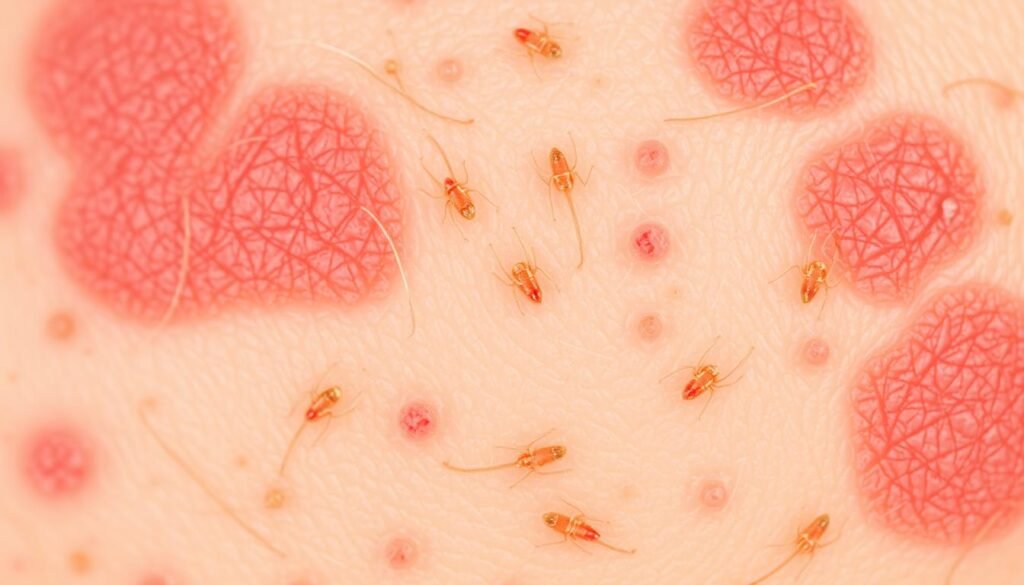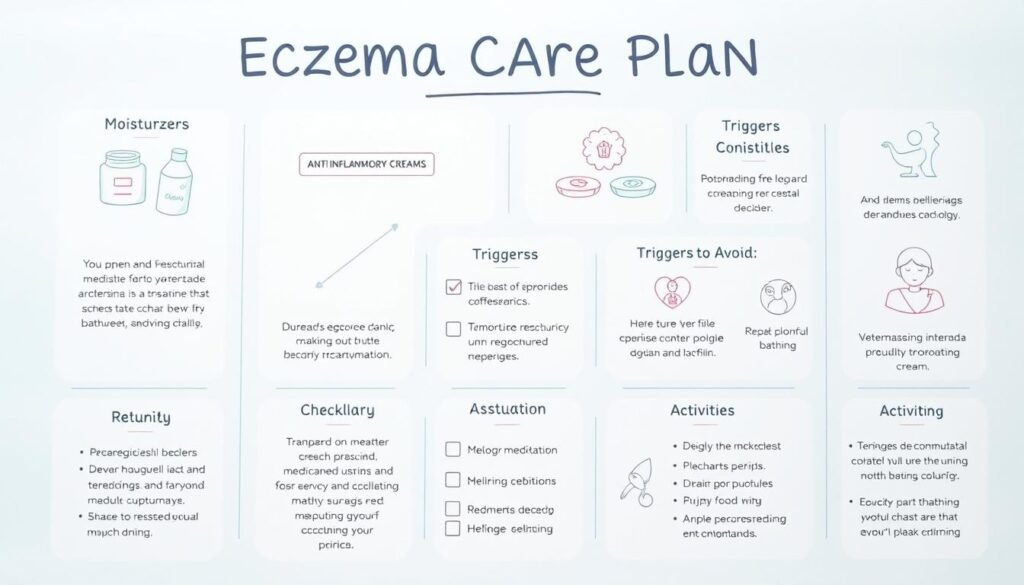About 10% of people worldwide have eczema. This condition greatly affects their daily life. It shows how crucial family and caregivers are in offering eczema support. When families know and use the right methods, they can help with the physical and emotional issues caused by eczema.
Family and caregivers are often the main support for those with eczema. Their care and learned caregiver education can better the management of eczema symptoms. This support is not just for physical health but also emotional. Being active and involved helps create an environment where those with eczema feel confident in their treatment.
This article offers strategies to help families support their loved ones with eczema. It aims for a common understanding of how to deal with this tough condition. Discover useful family and caregiver resources to help those impacted by eczema.
Key Takeaways
- Understanding and empathy are essential for effective eczema management.
- Family and caregivers can significantly impact emotional wellbeing.
- Proactive education allows better communication and support.
- Creating a comfortable living environment benefits those with eczema.
- Access to reliable resources enhances care strategies.
- Open discussions about triggers and symptoms strengthen care plans.
Understanding Eczema: What Families and Caregivers Need to Know
Eczema is a common skin issue that deeply affects people’s lives. Those who care for someone with eczema must understand it well. Knowing the eczema basics, its types, and causes are necessary.
Atopic dermatitis is a widespread type of eczema. It makes the skin dry, itchy, and swollen. Recognizing things like allergens and stress that worsen eczema is key. With the right eczema information, managing it becomes easier.
The reasons for eczema differ among people. Genes can affect how skin reacts to things around us. A good skincare routine is important to control eczema. It shows why caregiver education is vital.
Realizing everyone’s eczema is unique helps in giving support. When families know enough about eczema information, they can face its challenges better. This allows those affected to live more comfortably each day.
| Type of Eczema | Description | Common Triggers |
|---|---|---|
| Atopic Dermatitis | The most common form; often linked to allergies. | Food, dust mites, stress. |
| Contact Dermatitis | Caused by contact with irritants or allergens. | Soaps, detergents, certain metals. |
| Dyshidrotic Eczema | Characterized by small blisters on hands and feet. | Stress, humidity, metal exposure. |
Recognizing Symptoms and Triggers of Eczema
Understanding eczema symptoms is crucial for caregivers. Key signs are dryness, redness, and severe itching. These symptoms can change in strength. They may cause a lot of discomfort for the person affected.

It’s also vital to know what triggers eczema. Things like allergens, stress, humidity changes, and certain fabrics can make it worse. Caregivers need to watch how individuals react to these triggers. Knowing them can really help improve life quality for someone with eczema.
Being aware of these symptoms and triggers helps in managing them better. Using educational materials can boost caregiver knowledge. This helps them deal with flare-ups more effectively. Such care and attention can make a big difference. It improves both the emotional and physical health of those dealing with eczema.
Family and Caregiver Resources for Eczema Support
Families and caregivers are key in managing eczema. They need the right resources to be effective. There are many family caregiver resources focusing on education and emotional support. These resources help caregivers with knowledge and practical tips for eczema care.
Educational Guides and Materials
Organizations like the National Eczema Association provide great eczema educational materials. These materials cover symptoms and treatment options. They help caregivers support their loved ones better and improve skin health.
Support Organizations and Hotlines
Emotional support is crucial for eczema patients and their families. Many organizations and hotlines are there to help. They offer local and national support, allowing caregivers to connect and share. The caregiver support network is a great place for emotional healing.
Creating a Comfortable Living Environment
A comfortable home is key for lessening eczema symptoms. It’s important for families to pick the right products and settings. This helps curb discomfort by using skin-friendly items and keeping ideal conditions.
Skin-Friendly Household Products
Finding the right products is crucial for someone with eczema. Here are products that help:
- Gentle cleansers, like Dove Sensitive Skin Body Wash, avoid harsh chemicals.
- Moisturizers such as Cetaphil or Eucerin offer deep hydration without irritation.
- Fragrance-free laundry detergents, like Seventh Generation Free & Clear, reduce skin issues.
- Allergen-free cleaning supplies keep the home safe without triggering eczema.
Optimal Temperature and Humidity Levels
Keeping the right temperature and humidity is vital for comfort. Below is what’s best for skin:
| Condition | Recommended Level | Impact on Eczema |
|---|---|---|
| Temperature | 68°F – 72°F (20°C – 22°C) | Helps keep skin from drying and getting irritated. |
| Humidity | 30% – 50% | Helps skin stay moist, lessening eczema episodes. |
By using eczema-friendly products and adjusting the home environment, families make a big difference for those living with eczema.

Developing a Care Plan for Eczema Management
Creating an effective eczema care plan is key. Those with the condition need strong family support. Together, they can figure out the best management strategies that focus on personal needs. A good plan outlines treatments, daily habits, and skin health adjustments.
For a thorough care plan, families should:
- Assessment of Symptoms: Keep track of the person’s symptoms to spot patterns and triggers.
- Incorporation of Medical Treatments: Talk about medications and creams with doctors to make them part of daily life.
- Daily Routines: Set up skincare routines that include moisturizing and bathing to help and protect the skin.
- Environmental Adjustments: Change the home by choosing skin-friendly products and managing temperature and humidity to reduce flare-ups.
Updating the care plan often is essential. Changes in symptoms or the situation need sharing among family members. Everyone staying informed helps support and understand each other better. This teamwork makes managing eczema easier.

Effective Communication Strategies with Loved Ones
Effective communication is key in caring for someone. It helps families and caregivers connect when dealing with eczema. By using good communication techniques, they can share and understand each other’s feelings and concerns better.
Active Listening Techniques
Active listening brings people closer and lets caregivers meet their loved ones’ needs better. Here are methods to improve active listening:
- Maintain Eye Contact: This shows you’re truly interested and value what the speaker is saying.
- Use Reflective Listening: Repeat what the speaker has said in your own words to ensure you understand them. This encourages more sharing.
- Avoid Interruptions: Letting the speaker talk without cutting in shows you respect their thoughts and feelings.
- Ask Open-Ended Questions: These kinds of questions allow the speaker to explain more about their thoughts and feelings. It makes the conversation richer.
- Provide Non-Verbal Feedback: Nods and facial expressions show you’re engaged and empathize with the speaker.
These strategies not only aid in communicating well but also create a nurturing atmosphere. This support can reduce some burdens that come with managing eczema.
| Technique | Description | Benefits |
|---|---|---|
| Maintain Eye Contact | Look directly at the speaker to show engagement. | Enhances trust and connection. |
| Reflective Listening | Summarize the speaker’s words. | Clarifies understanding and encourages more sharing. |
| Avoid Interruptions | Allow the speaker to finish without interjecting. | Shows respect and patience. |
| Ask Open-Ended Questions | Encourage elaboration on their thoughts. | Promotes deeper insights. |
| Provide Non-Verbal Feedback | Nod and react to the speaker’s emotions. | Demonstrates understanding and empathy. |
Encouraging Proper Skincare Routines
Keeping up with good skincare is key for people with eczema. It’s all about staying moisturized and cleaning gently. Doing this can lessen symptoms and help the skin get healthier. Everyone should regularly moisturize and bathe carefully to help their skin heal faster.
Importance of Moisturization
Moisturizing well is at the heart of eczema care. It’s important to choose creams or ointments that are thick and free of fragrances. These help keep moisture in. Here are some recommended products:
| Product Type | Example Brands |
|---|---|
| Creams | Vanicream, CeraVe |
| Ointments | Aquaphor, Eucerin |
| Lotions | Cetaphil, Aveeno |
To keep your skin moist, put on moisturizers right after you bathe. Making this a part of your daily skin care will help avoid dryness and irritation.
Safe Bathing Practices
For people with eczema, how you bathe is really important. Take short baths with warm (not hot) water and use gentle soaps to cut down on skin irritation. After a bath, lock in moisture by using a moisturizer right away. It’s best to use:
- Fragrance-free and dye-free bath products
- Moisturizing cleansers, not harsh soaps
- Pat your skin dry instead of rubbing it with a towel
These bathing habits can improve skin health and make bathing more soothing. Following these steps helps caregivers maintain good skincare for those with eczema. For more detailed advice, check here.
Managing Stress and Emotional Wellbeing
Caregivers often struggle emotionally while helping those with eczema. They must see how stress links to skin health. This understanding aids their emotional health. Stress can make managing eczema harder.
Using good stress management methods is key for caregivers. Mindfulness, like meditation, helps stay calm and focused. Adding exercise or a hobby can ease stress too.
Getting caregiver support from groups is helpful. These groups allow for sharing tips and experiences. It’s vital for caregivers to care for their own emotional health.
When stress gets too high, seeing a counselor can help. They provide ways to handle stress and find balance. Remember, taking care of your mental health is crucial.
| Stress Management Techniques | Benefits |
|---|---|
| Mindfulness Meditation | Reduces anxiety and increases focus |
| Physical Exercise | Improves mood and boosts energy levels |
| Journaling | Facilitates emotional expression and provides clarity |
| Professional Counseling | Offers personalized support and coping strategies |
| Support Groups | Builds community and shared understanding |
In conclusion, a well-rounded approach to emotional wellbeing helps caregivers. By using effective stress management techniques, they support themselves and those they care for.
Family Counseling and Support Groups
Family counseling and support groups are very important. They give emotional support and help to people with eczema and their caregivers. People can share their stories and learn how to cope better.
This helps everyone feel less alone. It also improves their emotional health and strength in dealing with eczema.
Benefits of Group Therapy
Group therapy is really helpful for caregivers. It lets them share troubles and successes with people who get what they’re going through. They learn new ways to handle problems and feel more connected.
By talking about their experiences, families build a support network. This network can lower their stress a lot.
Finding Local Support Groups
It’s important to find local support groups and counseling. These groups offer advice and encouragement. Caregivers can find these groups through health care providers or online platforms.
For more tips on caregiver support, check out this link. Using these resources can make a big difference in how families deal with eczema.